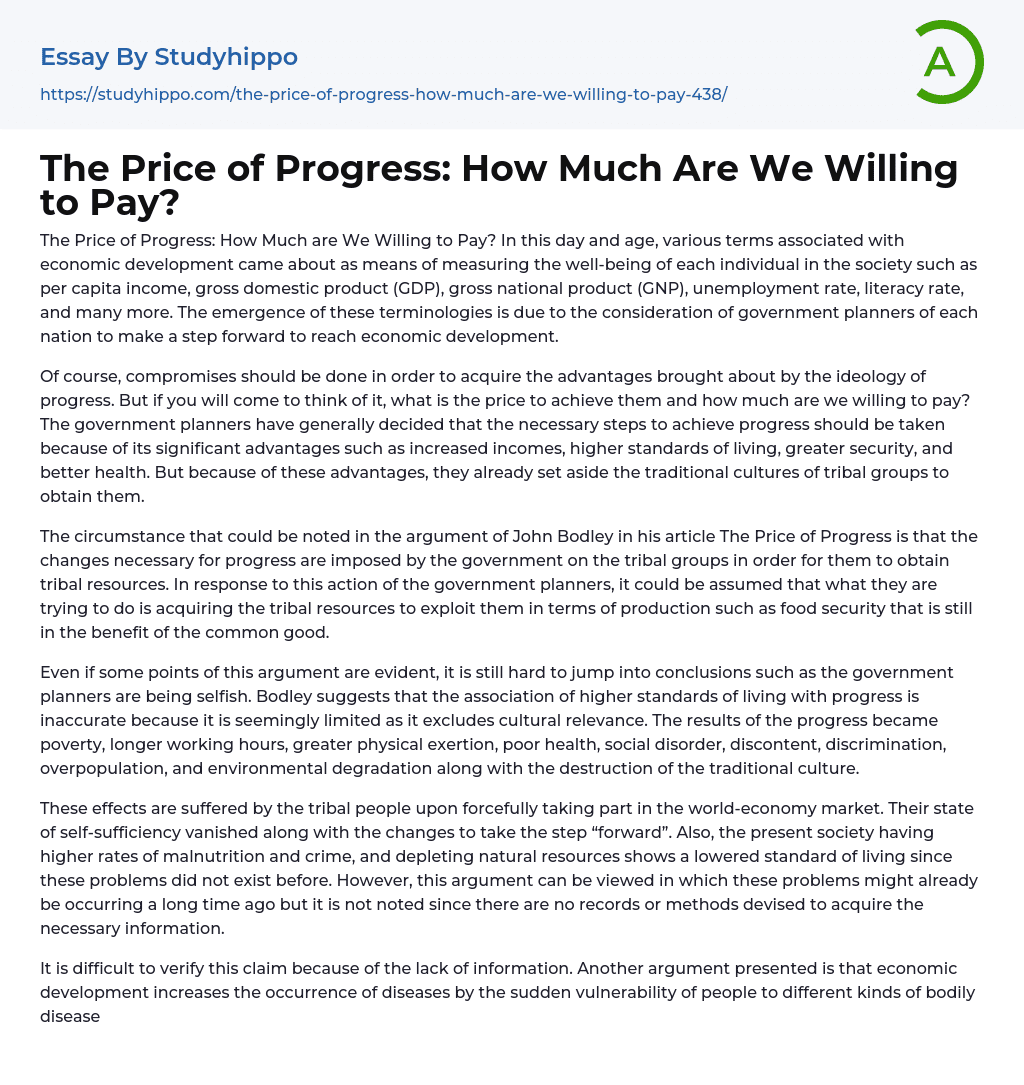

The Price of Progress: How Much Are We Willing to Pay? Essay Example
The discussion revolves around the compromise that society is willing to make for development and its cost. Currently, various indicators are used to assess individuals' financial situation, such as per capita income, gross domestic product (GDP), gross national product (GNP), unemployment rate, literacy rate, and others. These terms have become significant due to governments' efforts towards economic advancement.
While it is important to consider the sacrifices required to embrace progress, it is crucial to weigh its costs. Government planners generally acknowledge the advantages of progress, such as higher incomes, improved living standards, enhanced security, and better health. However, this pursuit has often overlooked the traditional cultures of tribal groups.
In his article "The Price of Progress," John Bodley argues that government-imposed changes are crucial for progress and involve tribal groups acquiring their resources. According to Bodley, these changes are motivated by the
...government's aim to utilize tribal resources for production, including ensuring food security, which ultimately improves overall welfare.
Although there are some obvious points, it is challenging to conclude that government planners are being selfish. Bodley argues that linking progress with higher standards of living is flawed because it ignores cultural significance. The outcomes of progress encompass poverty, longer work hours, increased physical exertion, health problems, societal disorder, discontentment, prejudice, overpopulation, environmental deterioration, and the erosion of traditional culture.
When tribal people are forced to participate in the global market economy, they experience these effects: their self-sufficiency is lost as they are pushed to "step forward". Consequently, modern society encounters higher rates of malnutrition and crime, along with the depletion of natural resources that reduces the standard of living compared to earlier times. Nonetheless, it can be contended
that these issues may have already existed in the past but went unnoticed due to a lack of records or methods for gathering necessary information.
Verifying the claim is difficult because of a lack of information. Additionally, economic development results in a rise in disease occurrence as individuals become susceptible to different bodily diseases, traditional environmental diseases, and poverty-related illnesses. These societal phenomena may stem from pollution-induced degradation of natural resources, which greatly affects people's health.
It is unfortunate to note that nearly all countries are experiencing significant changes. It is widely known that certain human activities, like factory production and the destruction of forests, are causing increased pollution in society. Additionally, the traditional populations' genetic abilities to adapt or resist their surroundings are being affected by the changes in the environment caused by developmental initiatives.
The article presents compelling evidence that the building of dams and irrigation systems has caused a rapid increase in snails carrying schistosomiasis or liver fluke disease. Additionally, the construction of roads and movement of labor in specific parts of Africa have contributed to the spread of sleeping sickness. Thankfully, through research and development, solutions have been found to combat these diseases within the community. Regrettably, new strains of these illnesses continue to arise, presenting additional obstacles.
Urbanization is a concept linked to development, as individuals from rural areas move to cities seeking opportunities to escape poverty and adjust to the changes caused by transformation. Nevertheless, overcrowding in urban areas has sparked worries about malnutrition resulting from limited resources. Consequently, city residents have had to modify their dietary habits and lifestyles. Thus, there exists a connection between scarcity and malnutrition, along with the changed
eating patterns and way of life encountered by those who have undergone detribalization.
As individuals become more integrated into the global economy, they are no longer self-sufficient and have to rely on purchasing expensive but less nourishing food using their earnings. This raises concerns about having enough money to afford food, potentially leading people to seek cheaper alternatives that may be less nutritious.
The tribal people face deprivation and discrimination in society if they do not meet the economic targets set by government planners. They perceive inequality as a result of progress, as they are seen as powerless and inferior to the dominant groups who are considered part of the "civilized and industrialized" nation. Our life choices resemble a coin with both positive and negative consequences.
The article discusses the adverse effects of progress on both our natural resources and tribal communities, despite the overall benefits it brings to the country. It underscores the importance of giving equal priority to social development in addition to economic development, so that the advantages of progress are not limited solely to the "civilized" population but also include tribal people.
By distributing the resources we have obtained, instead of taking what belongs to others, we can help reduce the gap between the rich and economically disadvantaged. It is also crucial to foster accountability in order to restore balance between people and natural resources, similar to how indigenous communities protect and manage their own resources.
- Pregnancy essays
- Death essays
- Asthma essays
- Chronic Pain essays
- Diabetes essays
- Infection essays
- Infertility essays
- Pain essays
- Sexually Transmitted Disease essays
- Cholesterol essays
- Epidemic essays
- Pathogen essays
- Symptom essays
- Water supply essays
- Myocardial Infarction essays
- Chronic essays
- Hypertension essays
- Black Death essays
- Breast Cancer essays
- Down Syndrome essays
- Apoptosis essays
- Tuskegee Syphilis Experiment essays
- Type 2 Diabetes essays
- Overpopulation essays
- Homelessness essays
- Hunger essays
- Dumpster Diving essays
- Homelessness In America essays
- Addiction essays
- Anatomy and Physiology essays
- Biodegradation essays
- Cancer essays
- Dental Care essays
- Disability essays
- Disease essays
- Disorders essays
- Health Care essays
- Infectious Disease essays
- Inquiry essays
- Intelligence Quotient essays
- Lung Cancer essays
- Medicine essays
- Neurology essays
- Nutrition essays
- Olfaction essays
- Physical Exercise essays
- Public Health essays
- Sex essays
- Women's Health essays
- World health organization essays



